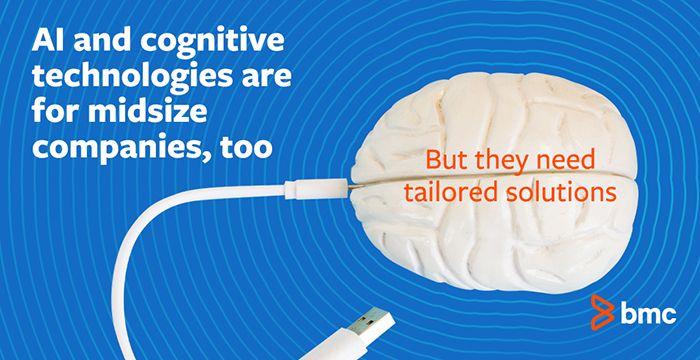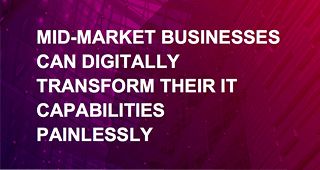Midsize businesses are not immune to a common challenge in the digital age: Innovate and adapt, or risk being disrupted. The stakes are high. CIOs in midsize firms “must reimagine themselves, their teams, and their services if they are to remain relevant in the next three to five years,” Gartner reports. But digital transformation can be daunting for midsize firms with fewer resources than enterprise firms.
Let’s explore some of the challenges these firms face as they begin their digital transformation journey, including a closer look at service management—the backbone of digital transformation—and the promising role of AI and cognitive technologies for midmarket firms.
Digital Transformation Barriers for Midmarket Firms
Digital transformation initiatives are underway in many firms. According to a recent BDO survey, 63 percent of midmarket companies have developed a digital transformation strategy, and another 31 percent indicated they’re currently developing a strategy. According to recent Techaisle data, the top three business goals in the midmarket are to increase profitability, increase growth, and reduce operational costs. To achieve these goals they’re prioritizing cloud, mobility, and other modern technologies.
These initiatives aren’t easy to execute. In that same BDO survey, midsize companies listed their top implementation challenges:
- lack of skills or insufficient training (54 percent)
- interoperability with legacy technology and processes (49 percent)
- underinvestment/under prioritization (43 percent)
- They also face budget constraints and the need to maintain existing IT infrastructure, according to Techaisle.
The takeaway: Midsize organizations have the same big-picture digital transformation goals as their large-company counterparts, but fewer resources to achieve them, and perhaps less margin for error. That doesn’t mean midsize companies can’t or won’t succeed. Rather, they need solutions tailored for their particular needs.
The Growth of AI and Cognitive Technologies
One of the most talked-about solutions—for both enterprise and midmarket companies—is AI and cognitive technologies. A recent Gartner survey found that 37 percent of companies today are already using AI in some form, a growth rate of 270 percent over the previous four years. As Gartner said in a release: “CIOs have realized that sustainable digital transformation and task automation go hand in hand.” Companies are increasingly interested in bringing greater cognitive capabilities and automation to how IT delivers services throughout the organization. And for good reason, too. A recent report from the research firm Aberdeen found that businesses with a cognitive ITSM solution are 70 percent more likely to lower the cost of IT service delivery, among other benefits.
The factors driving this shift to AI and automation in service delivery and management absolutely apply to midsize companies. Rising ticket volumes, increasing complexity, and a growing expectation among users for anywhere, anytime access to services—all of these factors impact the help desk of midmarket firms, and for similar reasons as in larger enterprises:
- The rapidly growing adoption of multi-cloud and hybrid cloud infrastructure as a powerful lever for digital transformation initiatives. Aberdeen research found that increased cloud and multi-cloud use as well as increasingly hybrid infrastructure were two of the top pressures to improve ITSM in midmarket companies.
- A vast number of new endpoints and apps hitting the network.
- The table-stakes expectation among users that they’ll get fast, accurate service from the devices and apps they use every day.
Most midmarket companies can’t deliver this service efficiently and cost-effectively with their existing ITSM solutions.
An AI and Cognitive Approach for the Midmarket
Should midsize firms look for ways to introduce cognitive capabilities into their service management? Absolutely. But this is a classic “don’t try to boil the ocean” strategy. To go from legacy ITSM to full-blown cognitive service management isn’t realistic.
Instead, midsize companies need a solution that enables them to cost-effectively introduce cognitive capabilities into their service portfolio while maintaining flexibility and scalability as their needs and goals change over time. This “run and reinvent” strategy ensures continuity in service yet allows organizations to introduce new products and experiences over time.
BMC Helix Remedyforce was built with this approach in mind:
- It brings the powerful cognitive capabilities of our BMC Helix Chatbot into a comprehensive ITSM solution that meets the needs of midsize companies.
- Chatbots enable you to make meaningful progress in your cognitive journey by creating intelligent, consumer-like experiences for your users via the devices and apps they use every day. This improves both accuracy and satisfaction for users while reducing the manual burden on your agents.
- A powerful and flexible automation engine allows you to automate any workflow or process.
- Improved self-service and intelligent omni-channel experiences empower your users and customers, and help transform your service organization from reactive to predictive, further fueling the company’s digital transformation initiatives while keeping costs under control
Built and delivered in the cloud, BMC Helix Remedyforce also allows you to extend your ITSM to IT Operations Management (ITOM). This means better visibility of your assets across your multi-cloud and hybrid environments, driving compliance while reducing risk.
It’s time to take the first steps in your cognitive journey. BMC Helix Remedyforce is ready to help.
Midsize firms have big digital transformation goals—and face big challenges in achieving them.
To succeed, they need an ITSM solution tailored to their needs.
Leverage AI technology in ITSM for your mid-market business
These postings are my own and do not necessarily represent BMC's position, strategies, or opinion.
See an error or have a suggestion? Please let us know by emailing blogs@bmc.com.







